The Checker Maven
Capers on the Kelso, Part 9
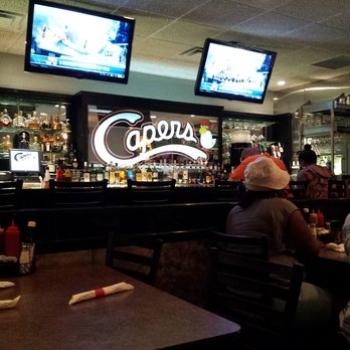
In researching this series we found that there are quite a few restaurants and bars named Capers, many more than we had ever expected, and representing varying meanings of the name. In the photo above, the Detroit-area bar named Capers is known to feature "good stiff drinks" although we're frankly not sure that's quite the right reputation to have.
At the Checker Maven, we're not drinkers ourselves, but if we were, we might still say that this week's problem merits a "good stiff drink."
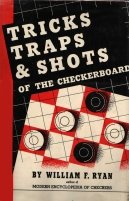
We'll be looking at yet another Kelso variation found in Willie Ryan's classic Tricks Traps & Shots of the Checkerboard. To be specific, it's Variation 2, Note H, in the original book. Here's the run-up without commentary. See previous columns in this series for notes and discussion.
| 1. | 10-15 | 22-18 |
| 2. | 15x22 | 25x18 |
| 3. | 11-15 | 18x11 |
| 4. | 8x15 | 21-17 |
| 5. | 4-8 | 17-13 |
| 6. | 9-14 | 29-25 |
| 7. | 6-10 | 24-20 |
| 8. | 1-6 | 28-24 |
| 9. | 8-11 | 32-28 |
| 10. | 14-17 | 25-21 |
| 11. | 10-14 | 23-19 |
| 12. | 7-10 | 30-25 |
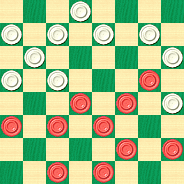
BLACK
Bblack to Play and Draw
B:W31,28,27,26,25,24,21,20,19,13:B17,15,14,12,11,10,6,5,3,2.
This position doesn't look so good for Black, to put it mildly, yet a draw is here. It will require no less than five "star" moves, and isn't at all easy to find; we'd call this an expert level problem for sure.
Whether you're an expert or not, the position is dramatic and worthy of study, and the solution is very pleasing. So do give it a try, and then click on Read More for the solution.![]()
The Lindyville Checker Club, Part 2

For the beginning of the story, go back and read Part One.
The Lindyville Checker Club was only open on Wednesday evenings and Saturday afternoons, so he thought he would be safe.
It was 11 PM, Thursday evening, on a cold winter's night, the wind sweeping across the Iowa plains with little to stop it. Hardly any one would be out. But William made sure he was in an interior room, with just one weak candle casting a dim, yellowish light. Just to be sure, though, he had pulled all the curtains tightly shut in the outer room.
The Checker Club had space on the upper story of the grain and feed store, a few old wooden tables and worn chairs scattered about a large room lined with sacks and boxes of farm supplies. Old Johnny Uggerud, the owner, was a checker player and let the Club use the space for free during the winter season, when he didn't need so much inventory. During his busy season, the Club had to close because Johnny needed all the space, but no one wanted to play checkers in the summer anyways.
William was the one who had organized the Club, a couple of years back, in 1898. There were about a dozen members, give or take; Lindyville was just a little town of about 500 people, but William took pride in having been able to start a club and keep it going. It had even gotten a mention in the American Checker Player magazine.
William shivered. Johnny turned off the iron stove downstairs promptly at five, when he closed up his shop, and there was no stove upstairs, so it got very cold very quickly. But William didn't plan on being here long.
Everyone knew that William was putting together a book of checker problems. But what he had to do tonight had to be done quickly and alone, without anyone knowing, unless it came to the worst. He had a plan for that, and tonight's secret labors were part of it.
William had come to town maybe five years ago, straight from the East. He never said a whole lot about what he had done in back there, but it must have made him some money, because one day he just got off the train and took a room in the hotel.
He spent about a month scouting around the town, talking to just a few people, and not answering any questions, not even from Sheriff Conway. The Sheriff wondered about William but didn't have any reason to do much more than that. It wasn't often that someone of independent means came to Lindyville with nothing particular in mind.
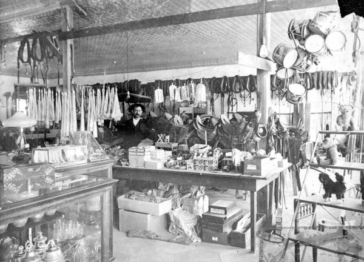
But at some point William must have chosen to put down stakes, because when Tim Forsch decided to retire and sell out his general store, William bought him out; he gave Tim his asking price without the slightest amount of bargaining. Tim thought it was kind of odd but took the money without asking any questions, and moved away to Iowa City to stay with his daughter and her family.
After that William started to get a little more friendly with the townsfolk, who had now become his customers. It turned out he shared an interest in checkers with some of the others, and so the Lindyville Checker Club came to be.
It was something like two weeks ago that William got the letter. He'd never forget a word of it.
"I know who you are and I know why you're there. You've got something that's mine and I'm coming to take it, and I'm going to take care of you, too."
The letter was postmarked Denver and was unsigned. It didn't have to be. William knew who it was from.
He wrapped himself tightly in his overcoat and sat at the desk in the little room, his manuscript and an old map in front of him. He'd have to finish tonight. He was running on borrowed time and he knew it.
At about 3 AM, he was done. He put the map in a trash can and lit a match, touching the flame to the edges of the map. It caught fire at once, crumbling quickly into brown and gray ash. William used the end of an umbrella to separate the ashes and put out the last sparks.
It was then that he heard a noise in the outer room. It sounded like a creaking floorboard. He had an ominous premonition about what that meant. He tugged on the bottom drawer of his desk, the drawer where he kept his loaded Smith & Wesson.
But the door to the room burst open and before he could reach his gun, and something hit him in the back of the head. He fell to the floor, still conscious, but reeling, blackness and light mixing together, spinning giddily. He looked up and saw a figure standing over him.
"You," he said. "How did you find me?"
The figure replied. "Took a while. But you owe me, and I owe you."
A knife descended, penetrating William's chest. The first thrust was fatal, and the killer knew it. He didn't even bother removing the knife.
# # #
Johnny found the body the next afternoon. He didn't go upstairs all that often; when he needed something brought down he sent his young assistant, Chris, who, being one to do as little as he could get away with, made the trip up and down as fast as possible. In any case, the door to the little office was closed and Chris had no reason to go in there.
But around three in the afternoon Johnny needed to look up an old order for a customer who wanted a duplicate. When Johnny opened the office door, he was so shocked that he nearly doubled the body count, coming within a hair's width of having a heart attack.
When he finally recovered enough to talk, he called for Chris, who took his time responding. Johnny sent him out to get Sheriff Conway and Doc Wilson, but from the looks of things the only one that the Doc was going to be able to help was Johnny.
Chris, for once, took something seriously. The Sheriff was out of town but was expected back in a couple of hours. The Doc came right away; he made Johnny lie down in the back room on the first floor, pronounced William dead, told everyone not to touch anything until the Sheriff arrived, and then took off to the tavern for a much-needed drink.
# # #
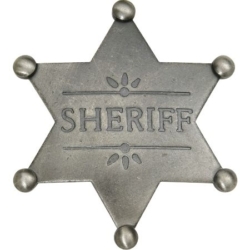
It was around six in the evening. Sheriff Conway went straight to Johnny's shop when he heard the news. The Sheriff made Johnny come back to the shop, even though it was past five. Doc had to come back, too, and the undertaker was told to come in a couple of hours. Johnny complained about not wanting to be in his shop after hours, conveniently ignoring the fact that there was a dead body in the upstairs office. The only one that didn't seem to mind was Chris, who was naively expecting to get paid overtime.
"Tell me again, Johnny," the Sheriff said. He had already taken a look at the crime scene and hadn't found anything useful. Now, they were all sitting around downstairs waiting for the undertaker to arrive.
"I told you already, Sheriff," Johnny said. "I opened the door and there he was."
"William had a key to the shop?"
"Sure he did," Johnny said. "He'd open up for the Checker Club and lock up when they were done."
"But the club didn't meet last night,"
"No, like I said, that's Wednesdays and last night was Thursday."
"Yet, obviously William was here. Do you have any idea why?"
"How would I know? Maybe he was doing some paperwork for the club or fooling with the book of his, you know, the one he's writing with all them checker problems in it."
"Well, whoever stabbed William tore the place apart, obviously looking for something. There's such a mess I can't figure nothing out," the Sheriff said. "You don't suppose you could look around and figure out if anything's missing?"
Johnny was upset enough about having to clean up. He wasn't going to take inventory, too. "Doubt it, Sheriff," Johnny said. "There's years worth of stuff up there. I'd never figure it out and besides, I don't hardly know nothing about William's checker club stuff. Don't hardly know nothing about William, either. Nobody really does."
The Sheriff's suspicions about William hadn't gone away over the years, but he never had anything definite to go on. Neither did he have anything to go on to try to solve the murder. The weapon was an ordinary hunting knife. Dozens of people in town probably had one just like it. There were no witness and no one had seen anything.
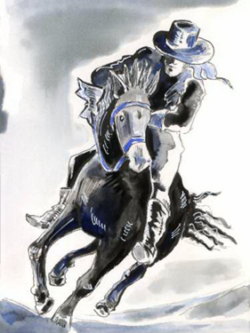
Later on the town drunk told the Sheriff about seeing a man on a horse ride into town and then ride back out a couple of hours later, but old Willie wasn't the most reliable witness and his descriptions were too vague to be of any use.
The case went cold, and it was to stay that way for more than a hundred years. By the time Sheriff Conway retired and moved to Lake City, even he had forgotten most of the details.
Old Johnny did try to straighten out the upstairs office, but it was such a mess he just threw everything into some wooden boxes and piled them in a corner. Years later, Johnny's heirs would move them into a warehouse, where they would lay untouched by anything but mice for many years to come.
TO BE CONTINUED.
# # #
This month's problem is a classic position, and rather easy.
BLACK
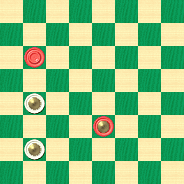
WHITE
White to Play and Win
W:WK25,K17:BK23,9.
When you've solved it, gallop on over to Read More to check your solution.![]()
Now We Have a Nice Problem
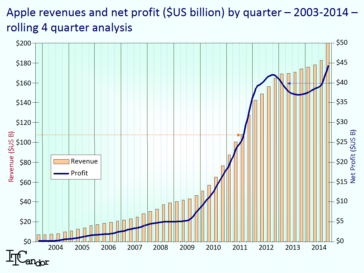
In the chart above, Apple Computer has the "nice problem" of having to figure out what to do with all the money they've made.
"A nice problem to have" is a phrase often heard when someone faces a "dilemma" in which any choice is a good one. Here in Hawai`i, we sometimes have to decide between going to the beach or going to the mall. That's considered a nice problem to have, especially in January.
"A nice problem" in checkers of course means something else, and this week's position, attributed to W. J. Wood, is an example. Mr. Wood himself, after presenting the run-up, stated "Now we have a nice problem." Did he intend a pun or play on words? We rather doubt it.
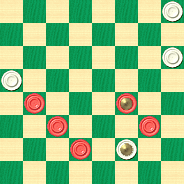
BLACK
Black to Play and win
B:W29,21,20,K6:B16,K14,11,9,7.
We'll warn you that the solution is very long, but it is also very methodical, and you should be able to work out the general direction if not every detail. There is a trap or two along the way, however, so be careful, and when you've given it a nice try, click your mouse nicely on Read More to see the solution and notes.![]()
Drummond Up Some Business

The expression, "drum up some business" originates in the idea of beating a drum to attract attention to something--- presumably, whatever it is the drum-beater wishes to sell. The idiom has since come to mean applying persistent effort in order to obtain a desired end, in this case, more business.
The person in the picture above supposedly went to Europe to "drum up some business." We didn't ascertain just what kind of business, but the poor fellow seems to look much like the spy left out in the cold. We gather it wasn't the most successful trip.
Old-time checkerist J. Drummond "drummoned up" plenty of business over his checkerboard, and was rarely left out in the cold. Today's Checker School position is credited to him.
BLACK
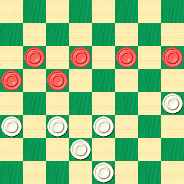
WHITE
White to Play and Draw
W:W20,21,22,23,26,31:B9,10,11,12,13,14.
Drum up the draw, then drum your mouse on Read More to see the solution, explanatory notes, and no less than six sample games.![]()
In Memoriam Jan Mortimer
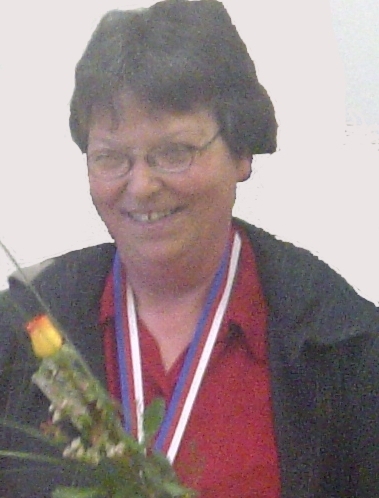
In honor of the memory of New Zealand checkerist Jan Mortimer, who passed away last week, The Checker Maven will not publish a problem or story this week.
Though we only met Jan on the telephone and by email, we knew her to be a wonderful person who contributed much and who will be forever missed. Requiescat in pace et in amore.![]()
